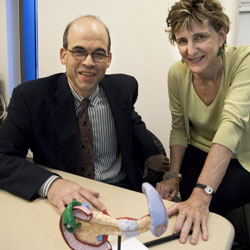Search Closes in on Pancreatic Cancer Gene
The search is narrowing for a gene associated with an inherited form of pancreatic cancer. Two years ago, researchers mapped the gene's location to the long arm of chromosome 4. With the neighborhood encircled, scientists are zooming in on the gene's address. To do so, they are shifting though data on more than 100 genes in the suspected region.
 |
| Dr. Teresa Brentnall, an expert on inherited forms of pancreas cancer, discusses a pancreas model with UW Dean of Humanities Michael Halleran, whose father and brother died of the disease. Halleran had his pancreas removed at UW Medical Center in 2002. |
Among several researchers at the Fred Hutchinson Cancer Research Center, the UW, and collaborating universities working on the genetics of pancreatic cancer is Dr. Teresa Brentnall, associate professor of medicine, Division of Gastronenterology. Brentnall has received a grant from the Lustgarten Foundation for Pancreatic Cancer Research to partially fund her studies. Named for Vice Chair of Cablevision Systems Marc Lustgarten, the foundation supports research necessary to find a cure for pancreatic cancer. Brentnall's grant is titled Discovery of a Familial Pancreatic Gene.
For years, clinical researchers didn't realize that some forms of pancreatic cancer run in families until they noticed patients mentioning that older relatives had had the disease, too. Today, data indicate that about 10 percent of pancreatic cancers are inherited.
Through participation as research subjects, families in which several relatives have had pancreatic cancer have played a significant role in advancing the search for genes related to the inherited form of the disease. In the grandparent's generation of one large family, five of six brothers died of pancreatic cancer. The cancer re-appeared in some of their children and grandchildren. Some affected members of these succeeding generations were found to carry a pancreatic susceptibility locus on chromosome 4. Family members unaffected by pancreatic cancer did not have this genetic marker. Finding a related gene should help this and similar families through early identification of those who are at risk for pancreatic cancer later in life.
In previous studies, Brentnall had examined the usefulness of looking for precancerous signs in people with a family history of pancreatic cancer. Her team's results suggest endoscopic techniques might be helpful in detecting abnormal changes in high-risk individuals.
Early symptoms are not obvious, and, because the pancreas is tucked in behind other organs, it is not easy to examine. Pancreatic cancer sometimes produces jaundice, nausea, and unexplained back pain before the condition is diagnosed. Cigarette smoking is tied to about one in four cases.
Pancreatic cancer is less common than some other cancers, but has a high fatality rate. Research on this disease, however, has lagged significantly behind other cancer studies. Brentnall has been active nationally to generate federal government support and scientific interest in pancreatic cancer research. Brentnall has joined with other biomedical leaders to set an agenda for action in aggressively pursuing studies on the biology, etiology, prevention, diagnosis, and treatment of pancreatic cancer as well as in training cancer researchers and clinical specialists.
